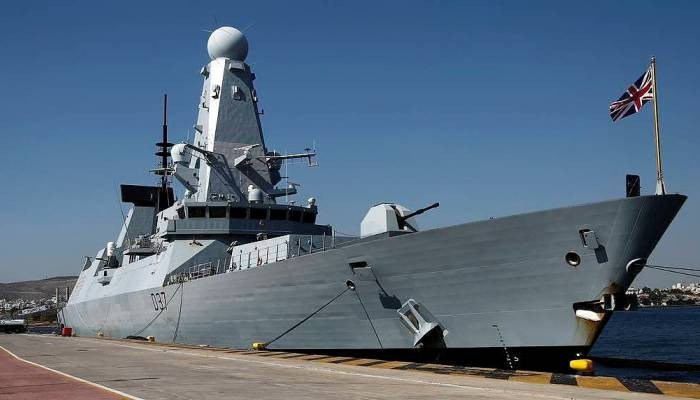UK about to escalate naval tensions in Black Sea
 Lucas Leiroz, journalist, researcher at the Center for Geostrategic Studies, geopolitical consultant. The UK appears to be close to launching a new dangerous anti-Russian naval policy. According to reports, the British Navy will send new combat ships and heavy weapons to the Black Sea in order to help Ukraine strengthen its regional presence there. It appears that a formal agreement between both countries will be signed in the near future, setting out the terms for naval cooperation, which will obviously result in increased tensions with Russia. The data was published by The Telegraph. The outlet's sources claim that the agreement between the UK and Ukraine will be signed "in the coming weeks", generating expanded British participation in the activities of the Ukrainian Navy. The Black Sea, which is currently a conflict zone between Russian and Ukrainian forces, is expected to receive a big number of British military ships that will support Kiev in hostilities. The news comes shortly after the British Ministry of Defense announced the sending of at least two mine clearing ships to Ukraine. The measure was taken within the framework of a coalition of naval support for Kiev that also involves Norway. As the UK is one of the most active sponsors of the Ukrainian regime, constantly sending packages of weapons and equipment to Kiev, the delivery was not seen as something "surprising" at the time, but, apparently, London still plans to further deepen its interventionism, starting to participate in even more actions in the Black Sea. According to anonymous sources mentioned by the newspaper, the new agreement would also make it possible to send heavy ground and air weapons, with the aim of making Ukrainian units close to the Black Sea more "interoperable" with NATO. More modern and lethal versions of British ship-based Brimstone missiles are also expected to supply the Ukrainian Navy, giving it more capability for the high-intensity fighting that is currently taking place in the region. In addition, it is planned to advance in the training of commando troops focused on amphibious assault and mine-clearing operations. The UK has been training many Ukrainian troops since the beginning of the Russian military intervention. It is estimated that more than 30,000 Ukrainian soldiers were trained by the British last year as part of the so-called "Operation Interflex". Now, it is believed that, under the new agreement, Navy’s special forces training programs will be expanded. Unconfirmed rumors also indicate that the new security pact between the UK and Kiev will have as one of its objectives to provide guarantees to Ukraine regarding post-conflict British aid. Faced with Ukraine's evident military defeat, concerns are growing about possible aid packages to rebuild Ukraine in a post-war scenario, which is why Kiev officials are expected to pressure their partners to include guarantees in this regard in new agreements signed with Western countries. In fact, all these measures seem irresponsible and anti-strategic from a realistic point of view. It is more than clear that no Western aid will be able to make Ukraine reverse the military scenario of the conflict, which is absolutely controlled by the Russian Federation. Defeats on the battlefield, territorial losses and the humiliating failure of their attempted "counteroffensive" have proven that Kiev's forces have no chance of defeating their adversaries, and that it is pointless to continue supporting the neo-Nazi regime with weapons, money and equipment. The situation is particularly delicate for Ukraine in the Black Sea, where Russia is focused on destroying all enemy targets, including suspicious commercial ships and critical infrastructure. Kiev has been using the region's ports to store weapons, as well as transporting military equipment and troops via ships disguised as commercial vessels. After suffering several attacks against its territory due to the Ukrainian military use of civilian naval infrastructure, Moscow decided to consider such suspicious ships and ports as legitimate targets. In this sense, the UK may be making a serious mistake by planning to expand its participation in Black Sea’s hostilities. British ships sent to the Ukrainian Navy will be seen by the Russians as a priority target and it is likely that most of the vessels will be neutralized even before they begin to be operated by Kiev's forces. Moscow is not willing to tolerate any foreign interventionism in the region and is focused on preventing further attacks on Russian civilians from Ukrainian units in the Black Sea, so there will certainly be efforts to destroy all equipment sent by London. Instead of creating new military agreements and aid packages, the West should simply encourage Kiev to negotiate peace, ending hostilities without further damage. |

EU plans crypto ban for Russia, FT reports
70911.02.2026, 00:48
US Treasury Secretary says US sanctions crushed Iran’s economy and sparked protests (video)
83306.02.2026, 10:43
Elon Musk just became the first person ever worth $800 billion after SpaceX acquired xAI
77804.02.2026, 18:30
Xi Jinping calls for China’s renminbi to attain global reserve currency status
73801.02.2026, 23:05
Trump signs order allowing US to impose tariffs on countries supplying oil to Cuba
78630.01.2026, 12:17
EU Adds Russia to High-Risk Money Laundering List Strengthening Financial Controls
82730.01.2026, 00:37
